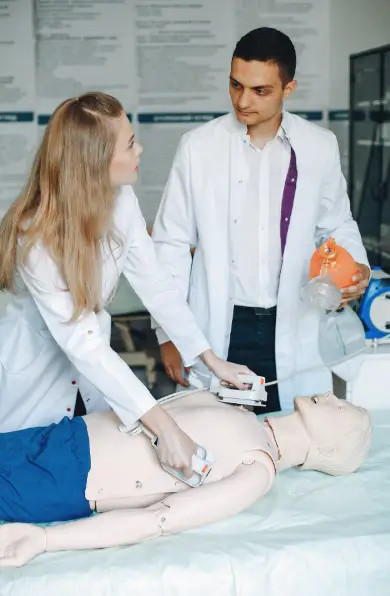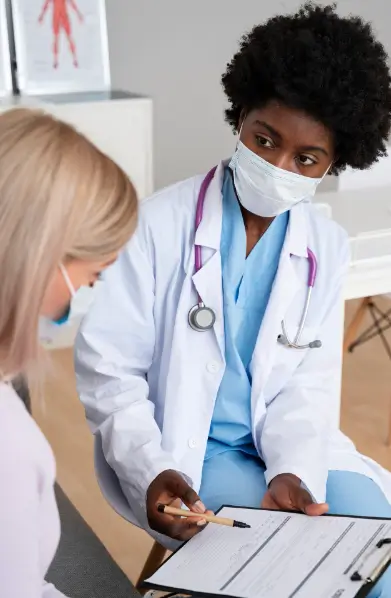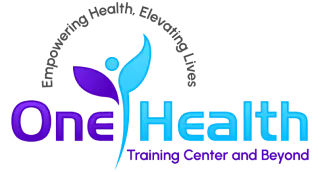American Heart Association certified training for healthcare professionals and community members in Massachusetts

Medical emergencies can occur anywhere, anytime, making Basic Life Support skills essential for healthcare professionals and community members throughout Massachusetts. Our comprehensive bls certification classes provide the knowledge and skills necessary to respond effectively to cardiac and respiratory emergencies, potentially saving lives in critical situations.
At One Health Training Center and Beyond, we provide American Heart Association certified Basic Life Support training that meets the highest national standards for emergency response education. Dr. Jocelyne Destine’s clinical expertise ensures our instruction reflects current best practices and evidence-based approaches to emergency care, preparing students to respond confidently in life-threatening situations.
Our structured approach to Basic Life Support education covers all essential components of effective emergency response. Students learn proper techniques for cardiopulmonary resuscitation (CPR) for adults, children, and infants, as well as the use of automated external defibrillators (AEDs) in various emergency scenarios.
The bls certification classes emphasize high-quality chest compressions, effective rescue breathing, and coordinated team response strategies. Students practice on professional training manikins that provide real-time feedback on compression depth, rate, and technique. This hands-on approach ensures students develop the muscle memory and confidence necessary for effective emergency response.

Understanding how to recognize cardiac arrest and other life-threatening emergencies represents a critical component of Basic Life Support training. Our program teaches students to assess responsiveness, check for normal breathing, and activate emergency medical services appropriately when encountering potential cardiac emergencies.
Students learn about the chain of survival concept and their role in providing immediate care until advanced medical help arrives. The curriculum covers different types of cardiac rhythms, the importance of early defibrillation, and factors that affect survival outcomes in cardiac arrest situations. This comprehensive understanding helps students make appropriate decisions during actual emergencies.
Practical skill development forms the foundation of our BLS certification training approach. Students spend extensive time practicing chest compressions, rescue breathing, and AED operation on professional training equipment. Our instructors provide individualized feedback and coaching to help each student master proper techniques. The program includes practice scenarios that simulate real-world emergency situations, helping students develop the ability to remain calm and focused under pressure. Students work individually and in teams to practice coordinated response strategies commonly used by healthcare professionals and emergency responders throughout Massachusetts.
Automated External Defibrillators provide critical interventions during cardiac arrest emergencies. Our Basic Life Support training includes comprehensive instruction on AED operation, safety considerations, and proper integration of defibrillation with CPR techniques. Students practice with multiple AED models to ensure familiarity with different devices. The curriculum covers AED maintenance requirements, troubleshooting common problems, and legal considerations surrounding AED use by trained individuals. Students learn about Good Samaritan laws in Massachusetts and their protection when providing emergency care in good faith according to their training level.
Healthcare professionals often respond to emergencies as part of coordinated teams. Our bls certification classes include extensive practice with team-based response scenarios where students assume different roles including team leader, compressor, ventilator, and AED operator while maintaining effective communication throughout the emergency. Students learn about role assignments, clear communication strategies, and effective leadership during emergency situations. This team-based approach reflects real-world healthcare environments throughout Massachusetts where coordinated response improves patient outcomes during cardiac arrest and other medical emergencies.
Basic Life Support techniques require modifications based on patient age, size, and specific circumstances. Our training program covers proper techniques for adults, children, and infants, including differences in compression depth, rate, and hand positioning for different age groups. The curriculum addresses special situations including choking emergencies, drowning incidents, and cardiac arrest in pregnant patients. Students learn to adapt their response based on environmental factors and available equipment while maintaining focus on high-quality life support measures throughout Massachusetts communities and healthcare facilities.
Understanding the legal framework surrounding emergency response helps students respond appropriately while protecting themselves and the patients they assist. Our Basic Life Support training covers Good Samaritan laws, consent issues, and scope of practice considerations for both healthcare professionals and lay responders in Massachusetts.
Students learn about documentation requirements following emergency response, reporting procedures for healthcare facilities, and the importance of continuing education to maintain current certification. This comprehensive approach ensures graduates understand their responsibilities and protections when providing emergency care in various settings.

Many Massachusetts healthcare facilities require employees to maintain current Basic Life Support certification as a condition of employment. Our American Heart Association certified program meets these requirements while providing skills that extend beyond workplace obligations to benefit the broader community.
Healthcare professionals often serve as first responders during emergencies in their facilities. Our training prepares students for these leadership roles while emphasizing the importance of activating additional resources and following facility-specific emergency response protocols when available.
Basic Life Support skills benefit entire communities by increasing the number of trained individuals capable of responding to cardiac emergencies. Our training program emphasizes the community service aspect of BLS certification and encourages graduates to share their knowledge with family members, coworkers, and community groups throughout Massachusetts.
Students learn about the importance of widespread CPR training in improving survival rates from cardiac arrest. The program encourages graduates to become advocates for emergency preparedness and to support efforts to increase AED availability in public spaces, schools, and workplaces throughout their communities.
American Heart Association Basic Life Support certification requires periodic renewal to ensure skills remain current and effective. Our program provides students with information about renewal requirements, timelines, and options for maintaining their certification over time.
We offer convenient renewal classes for graduates and other healthcare professionals throughout Massachusetts who need to update their BLS certification. These renewal sessions focus on skill practice, updates to guidelines, and reinforcement of critical concepts essential for effective emergency response.
Massachusetts professionals and community members appreciate our accommodating approach to BLS certification training. Day, evening, and weekend class options ensure that work schedules, family obligations, and other commitments do not prevent motivated individuals from obtaining this valuable certification.
Our scheduling flexibility extends to group training sessions for healthcare facilities, schools, and community organizations that want to train multiple individuals simultaneously. We can arrange customized training sessions at convenient locations throughout Massachusetts to meet specific organizational needs.
Dr. Jocelyne Destine’s background as a Family Nurse Practitioner and Doctor of Nursing Practice provides students with instruction based on extensive clinical experience with cardiac emergencies and critical care situations. Her expertise ensures students receive training that reflects real-world emergency response challenges and best practices.
Our certified instructors maintain current knowledge of American Heart Association guidelines and participate in ongoing education to provide students with the most current information and techniques. Small class sizes ensure personalized attention and ample opportunity for skill practice and questions throughout the training program.

Our Basic Life Support certification program welcomes participants from diverse backgrounds who share an interest in emergency preparedness and community service. The program requires no previous medical training, making it accessible to healthcare professionals, teachers, coaches, parents, and other community members throughout Massachusetts.Students must demonstrate the physical ability to perform chest compressions and rescue breathing effectively, but we provide accommodations and alternative techniques when possible to support diverse learners. Our inclusive approach ensures that community members with various abilities can contribute to emergency preparedness efforts.
Join the growing number of Massachusetts residents who have obtained Basic Life Support certification through our American Heart Association approved program. These life-saving skills benefit your professional development while providing the knowledge and confidence to respond effectively during cardiac emergencies in your community. Contact One Health Training Center and Beyond today to learn more about upcoming bls certification classes, program requirements, and how you can make a difference through emergency response training that serves both your career goals and community service aspirations throughout Massachusetts.

Jocelyne Destine provides high-quality healthcare training programs, including CNA, HHA, BLS, and MAP courses. With a focus on practical learning and flexible options, we prepare students for rewarding careers in healthcare. Join us to unlock your potential and make a difference.
© 2024 One Health Training Center and Beyond